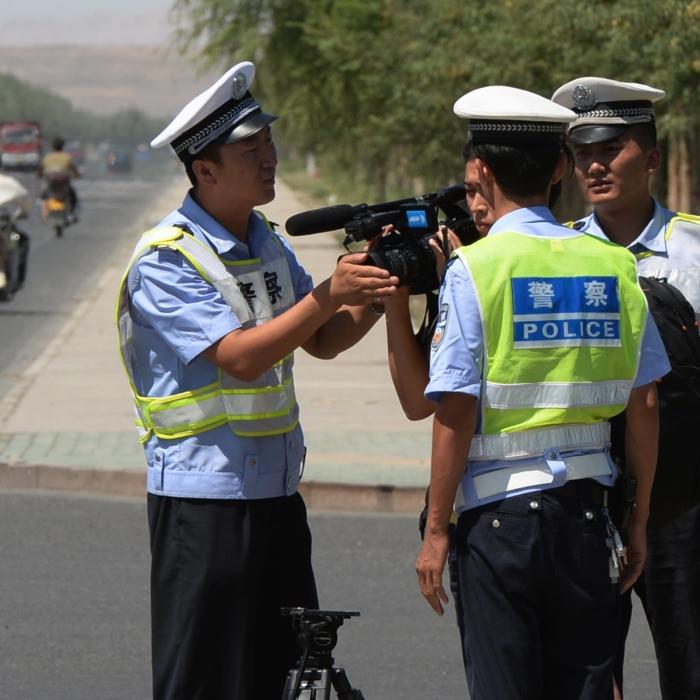The new anti-espionage law introduced by the Chinese Communist Party (CCP) on July 1 has raised widespread concern among employees of foreign companies in China owing to the expanded definition of espionage. A survey showed that more than half of the Japanese companies in China expressed concern over their future operations in the country.
The final result, published on Aug. 11, showed that of these 88 companies, 15 were “very worried” and 48 were “somewhat worried” about the anti-espionage law. The total percentage of respondents who were worried was 53.4 percent.
Only 11 respondents, or 9.3 percent, were “not too worried.” However, some of the companies that were “not too worried” have not yet started their operations in China, which might indicate that they are not yet familiar with the regime. Fourteen companies, or 11.9 percent, chose “other,” and none of the companies chose “not at all worried.”
The survey found that 86 of the 88 companies have already taken measures to address the anti-espionage law. Many have warned their employees in China and those who visit on business trips to be aware of the new law. The survey also shows that Japanese companies in China are concerned about the risk of their employees being arbitrarily detained in their daily lives and on business trips.
The new law expanded the definition of espionage. Previously, the legal definition of espionage focused on the disclosure of so-called state secrets and intelligence. The new version expanded the definition to include documents, data, information, and items related to national security, as well as instigating, inducing, coercing, or bribing state employees.
On top of that, the law does not provide a specific definition for national security or state secrets. As a result, many Japanese company managers in China are worried that the CCP will use espionage charges to arbitrarily detain their employees in the future, given the increasingly tense relationship between the two countries.
Under the original anti-espionage law passed in 2014, a total of 17 Japanese citizens have been detained, and nine of them were formally sentenced. Eleven have been released after arbitrary detention or completion of their sentences, and one died in prison. There are presently five Japanese citizens detained by the CCP or serving their sentences in prison.
‘Japanese Spy’ Describes Human Rights Violations
Eiji Suzuki was arrested by the Chinese regime on charges of espionage and was jailed for six years. In February, he attended a hearing at the Japanese National Diet hosted by legislators all across the political aisle who were concerned about China’s human rights abuses. Mr. Suzuki shared his experience and called for an end to the CCP’s human rights abuses.Originally, Mr. Suzuki was quite friendly with Chinese officials, even studying Chinese politics and foreign relations. He had a close relationship with Zhang Xiangshan, former deputy minister of the CCP’s Central Committee Foreign Affairs Commission and vice-president of the China-Japan Friendship Association.
By the time Mr. Suzuki was arrested in 2016, he had visited China over 200 times and served as chairman of the Japan-China Youth Exchange Association.
In July 2016, Mr. Suzuki was suddenly arrested by six Chinese state security officers at Beijing International Airport on suspicion of espionage. He was held in a closed, isolated venue and was subjected to a seven-month interrogation.
Mr. Suzuki said that the room in which he was held had no clock, no pens or paper, no TV, and not even a toilet or shower. The curtains were always closed and he slept every night with the lights on.
He recalled that once he begged the guards to let him see some sunlight and was only allowed to hang out by the window for 15 minutes. Mr. Suzuki was later sentenced to six years in prison.
In October 2022 he was released and returned to Japan.
Mr. Suzuki was reportedly arrested for, among other things, asking a CCP official about North Korea. When the South Korean media reported that Kim Jong-il’s son-in-law, Jang Song-thaek, had been executed, Mr. Suzuki asked a Chinese official about what happened purely out of curiosity. The official replied that he was not sure what happened. This was supposedly evidence of his illegal intelligence-gathering. Mr. Suzuki found it incomprehensible that he was accused of such an absurd crime. He said that others in the future may experience similar treatment by the CCP and he urged the Japanese government to protect their citizens in China.
Government Urges Caution When Visiting China
Following the implementation of China’s new anti-espionage law, the Ministry of Foreign Affairs of Japan issued a warning on its website that any behavior that is deemed to “bring harm to national security” in China can be investigated under the new law. The warning included that there are risks of arbitrary detention by state security and unjust charges and sentences. Japan is advising its citizens to exercise caution when visiting China.The Ministry of Foreign Affairs of Japan gave specific examples of what may constitute espionage based on past cases, such as participating in religious activities in non-approved venues, engaging in statistical surveys, academic surveys, geological surveys, and archaeological surveys without permission. It also warned that in China, cellphones, computers, and other electronic devices may be subject to surveillance, as well as when using social media and emails.
A Tokyo-based consulting firm said it has been inundated with inquiries from companies with expatriate staff in China about the regime’s anti-espionage law, including on how to caution employees and business travelers in China. Many are considering canceling business events in China and reducing the number of staff stationed in the country, especially after the arrest of the Astellas Pharma executive in March. The firm advised people to act in accordance with travel safety advice released by the Japanese government in June.
In July 2022, there were 12,706 Japanese companies conducting business with China, and in October 2022, there were 107,715 Japanese citizens living in China.






